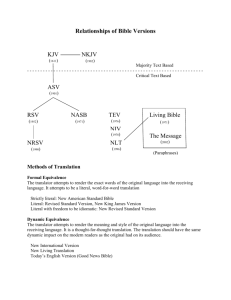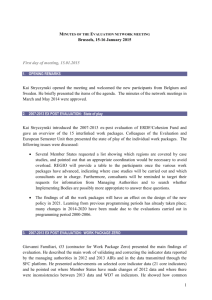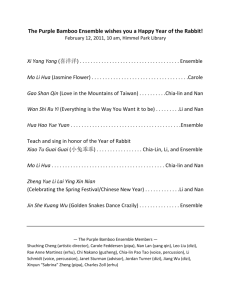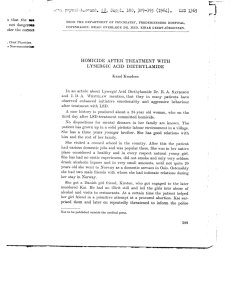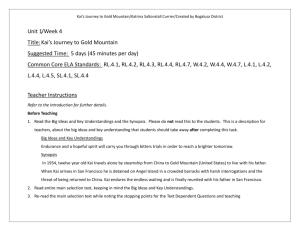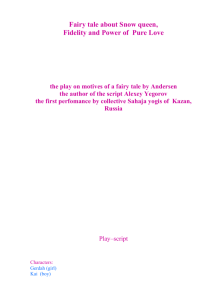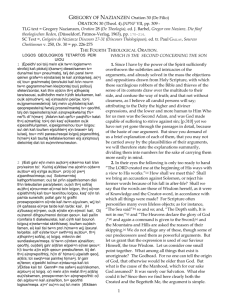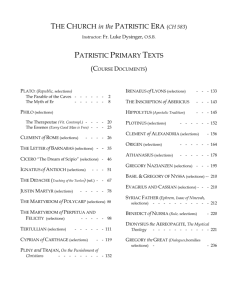Studying a Biblical Text
advertisement
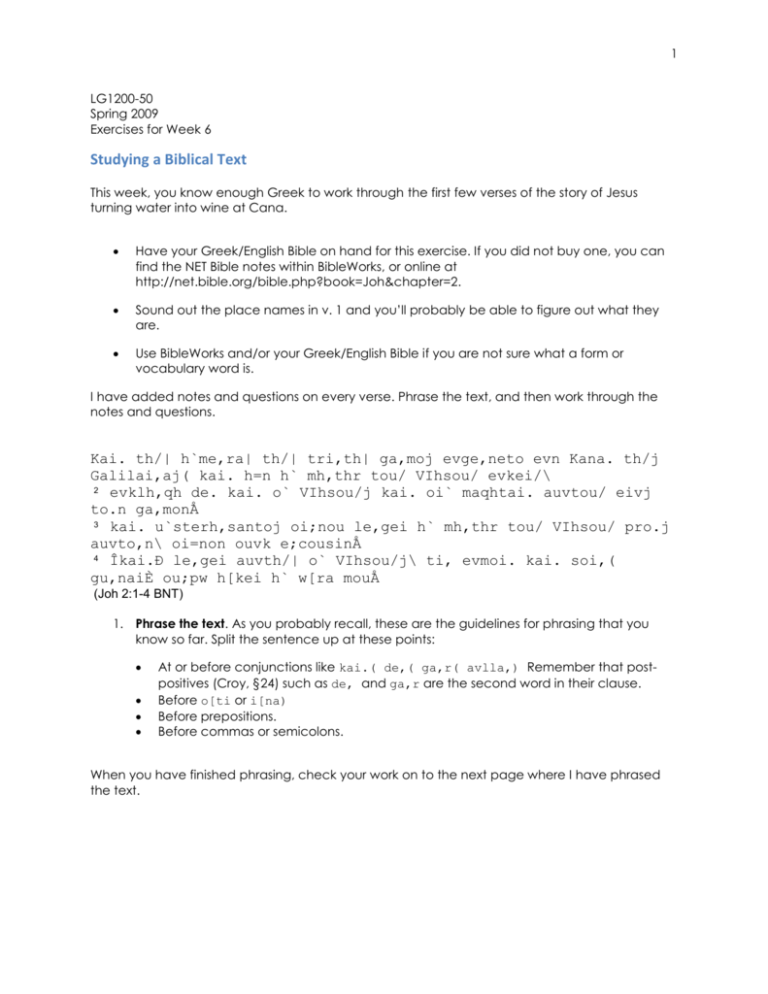
1 LG1200-50 Spring 2009 Exercises for Week 6 Studying a Biblical Text This week, you know enough Greek to work through the first few verses of the story of Jesus turning water into wine at Cana. Have your Greek/English Bible on hand for this exercise. If you did not buy one, you can find the NET Bible notes within BibleWorks, or online at http://net.bible.org/bible.php?book=Joh&chapter=2. Sound out the place names in v. 1 and you’ll probably be able to figure out what they are. Use BibleWorks and/or your Greek/English Bible if you are not sure what a form or vocabulary word is. I have added notes and questions on every verse. Phrase the text, and then work through the notes and questions. Kai. th/| h`me,ra| th/| tri,th| ga,moj evge,neto evn Kana. th/j Galilai,aj( kai. h=n h` mh,thr tou/ VIhsou/ evkei/\ 2 evklh,qh de. kai. o` VIhsou/j kai. oi` maqhtai. auvtou/ eivj to.n ga,monÅ 3 kai. u`sterh,santoj oi;nou le,gei h` mh,thr tou/ VIhsou/ pro.j auvto,n\ oi=non ouvk e;cousinÅ 4 Îkai.Ð le,gei auvth/| o` VIhsou/j\ ti, evmoi. kai. soi,( gu,naiÈ ou;pw h[kei h` w[ra mouÅ (Joh 2:1-4 BNT) 1. Phrase the text. As you probably recall, these are the guidelines for phrasing that you know so far. Split the sentence up at these points: At or before conjunctions like kai.( de,( ga,r( avlla,) Remember that postpositives (Croy, §24) such as de, and ga,r are the second word in their clause. Before o[ti or i[na) Before prepositions. Before commas or semicolons. When you have finished phrasing, check your work on to the next page where I have phrased the text. 2 2. Translate the text. Verse 1 Phrase Kai. th/| h`me,ra| th/| tri,th| ga,moj evge,neto Notes & Questions Is tri,th in attributive position or predicate position? Croy Section §30 What is tri,th describing? write your translation here: evn Kana. th/j Galilai,aj( There are two place names here. Sound them out & you’ll know them. write your translation here: kai. h=n h` mh,thr tou/ VIhsou/ evkei/\ There is a form of the verb “to be” here. What is it? §67 What is the subject of this clause? write your translation here: 2 evklh,qh de. kai. o` VIhsou/j kai. oi` maqhtai. auvtou/ You know this verb, but you do not yet know the form (aorist passive). Mouse over the word in BW to see what it is from. What is the dictionary form of evklh,qh? de. kai. looks odd, but is common in the NT. Look at meaning 5.a for de. in BDAG for help translating. (BDAG is a lexicon in the Homelab version of BibleWorks. The Gingrich lexicon, in all copies of BW, is not as helpful but it does mention the form in the entry for de..) write your translation here: eivj to.n ga,monÅ Name the object of the preposition eivj and give that object’s case. write your translation here: 3 kai. u`sterh,santoj oi;nou Here is a construction you do not know. It’s called a genitive absolute. You’ll learn it when you learn participles. §135 “And when the wine gave out” le,gei h` mh,thr tou/ VIhsou/ pro.j auvto,n\ Is Jesus speaking here or his mother? How do you know? What is the pronoun auvto,n doing here? Your choices are: (a) regular, (b) emphatic, (c) intensive, (d) identical. §51 What is the dictionary form of that verb? What tense, voice, and mood is §11 write your translation here oi=non ouvk e;cousinÅ 3 Verse Phrase Notes & Questions Croy Section it? write your translation here 4 auvth/| is feminine dative singular. Îkai.Ð le,gei auvth/| o` VIhsou/j\ §17 Why? What is its function in the sentence? Notice the tense of le,gei. The story happened in the past, but the narrator has shifted into the present to tell it. This use of present tense is called the historical present. It may be translated as simple past. write your translation here ti, evmoi. kai. soi,( gu,naiÈ Study the NET Bible note on this phrase. Compare at least three translations at this point and notice how widely varied they are. Why? write your translation here h[kw is an odd verb in that it has a perfect tense sounding meaning in the present, “to have come.” ou;pw h[kei h` w[ra mouÅ write your translation here Write out an English translation of these four verses that is faithful to the Greek and still flows well in English. 3. Compare your translation with one published translation. Where are they the same? Where are they different? Which do you like better? My Translation paste here A Bible Version paste here 4. Engage the text with questions like these: Notice Characters Who is present? Comments on similarities and differences 4 Who speaks? Who has a name? Who doesn’t have a name? Notice Time & Tense What is past? What is present? What is future? One Last Question: Having read this far into the story, what do you expect to happen?
